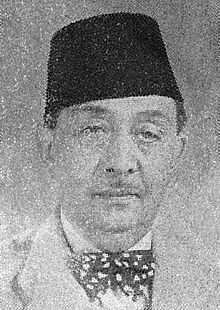Marah Rusli
| Marah Roesli | |
|---|---|

Marah Roesli, 1954
|
|
| Born | Marah Roesli 1889, August 7 Padang, West Sumatra |
| Died | 1968, January 17 Bandung, West Java |
| Language | Indonesia |
| Nationality | Indonesian |
| Citizenship | Indonesia |
| Genre | Poetry |
| Subject | Literature |
| Notable works | Sitti Nurbaya (1920) |
Marah Roesli ([ˈmarah ˈrusli]; full name: Marah Rusli bin Abu Bakar) was an Indonesian writer.
Marah Roesli was born in Padang, West Sumatra on August 7, 1889, and died in Bandung, West Java on January 17, 1968. He was one of the most well-known Indonesian authors from the Balai Pustaka period. He is famous for his novel Sitti Nurbaya, which tells the story of a teenage girl who was forced to marry a man much older than herself to recompense his father's debt. Like other Minangkabau authors, such as Hamka, Ali Akbar Navis, and Abdul Muis, his novels centre on the theme of the increasingly bankrupt Minangkabau culture.
Marah Roesli's father, Sultan Abu Bakar, was a nobleman with the rank Sultan Pangeran. Against his family's wishes, Marah Roesli married a Sundanese woman born in Bogor in 1911, and they had three children, two boys and one girl. Although this marriage was strongly abhorred by his parents, he did not give it up.
Although he is known as a famous novelist, he was a veterinarian by profession. Unlike Taufik Ismail and Asrul Sani, who both completely left their practices as veterinarians to become authors, Marah Roesli kept working in that profession until he retired in 1952 with the title of Head Veterinary. He loved literature from a young age, and always loved listening to stories from the itinerant story tellers in Western Sumatra, and reading literature.
In the history of Indonesian literature, Marah Roesli is noted as the first author of a novel, and was designated by Jassin as the "Father of the Modern Indonesian Novel". Before the first novels were written in Indonesia, the prose literature was more similar to folk stories.
...
Wikipedia
